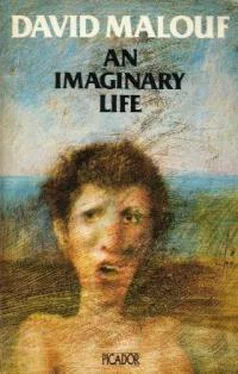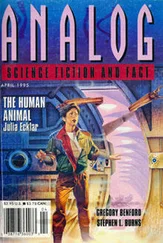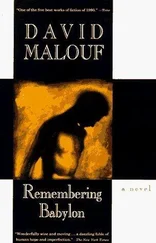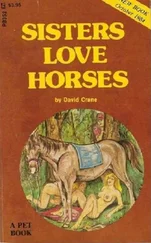Did I really see him? Or did I see suddenly, after all these years, the Child who used to be my secret companion at Sulmo, and whose very existence I had forgotten. Suddenly he was here again before me. Was the vision real? I am skeptical. But the men believe. They mount quickly and go galloping off in the direction my arm is pointing, their hooves kicking up clods and showers of leaves; and at the same time half dozen deed who have been grazing out of sight come skittering across the clearing towards me, swerving in panic as I shout and fall. The men when they come back are full of a story they cannot get me to understand. Did they actually see the boy?
Surely he cannot have outrun them. He must have gone to earth somewhere, in a wolf’s lair, or deep into a trough of leaves, or under the roots of some tree. We ride slowly among the trees, weaving in and out among the silvery trunks, as if in a dream, calling to one another to mark positions and keeping our eyes open for any sign of movement, our ears pricked for a sound. We startle odd groups of deer, and one of the young men shoots one and slings it across his shoulder to make our evening meal. All afternoon we circle round the same few hundred yards of forest as in a dream, till the evening mist begins to gather and the light fades. What will we do, I ask myself, if we see the boy? Give chase and capture him? Then what? And who is he? The day grows blue, shadows gather around us and the old man decides to make camp.
We tether the horses and the old man assigns each of us a task. Mine is to gather sticks for the fire. One of young men also stays behind, to flay and butcher the deer, which he does swiftly and cleanly, hanging the whole skin over a branch and chopping the meat into haunches and chunks for roasting. The entrails he leaves to one side, together with a gourd filled with the first of the animal’s blood.
I wander about, muttering to myself and making my pile of sticks, then sit hugging my knees and thinking of him: the Child. Where is he? Is he still watching us from where he cannot be seen? What I remember clearly now are his eyes, fixed on me across the open space between the trees. That stare is something I could not have imagined. I have seen nothing like it before, except from the eyes of my Child, so many years ago. I have invented nothing like it in my poems, that were full of strange creatures caught between man and some higher or lower creature, in a moment of painful transformation. It exceeds my imagining, that sharp little face with its black stare, and I think how poorly my poetry, with its elegant fables and pretty, explainable miracles, compares with the accidental reality of this creature who must exist (if he does exist) not to impress but simply because he has somehow tumbled into being. I hug my knees and talk to myself in my own tongue, so that the young hunstman, who is covered with blood, but very open-faced and innocent looking, is alarmed and keeps away from me. When the others come back I see him speak to the old man, who glances shyly over his arm at me, and I have to shake myself back into society - if that is what it can be called, when I and these men have only the likeness of our humanity to share, and neither experience, custom nor tongue between us. I watch the shaman spread out his symbols on the beaten grass. A fish-bone needle, a lump of river clay formed into a crude ball, a handful of seeds. He places these objects in a circle drawn around him with the bone, and I listen as he begins to rock back and forth on his haunches, drawing out of himself a high-pitched womanish voice like the one the old man uses in his tales, but higher far, more unearthly, as he lets it forth in little yelps and squeals or in long slow whistles, and sways above the earth. At last, when he falls still and seems asleep, his hands open before him, the young man who has killed and butchered the deer comes to the edge of the circle with his gourd of blood. He paints a little of it on the shaman’s forehead with his forefinger, touches the wrinkled lips, then pours a few drops into the shaman’s hands. The rest he trails around the margin of the cirlce, and we sit outside, in the growing dark, till the shaman begins to speak, half a dozen syllables repeated over and over again in his own voice, with little yelping sounds of the other voice between. Then suddenly he wakes and it is over. He has, while we watched, been on a dream journey to the distant polar regions. His spirit has been there, moving fast over the frozen steppes across the river into the grinding wastes, and it is the voice of the polar spirits we have heard through him. Now suddenly he is one of us again, a perfectly ordinary old man, hungry, a little stiff in the joints, moving about on his buckled legs to help make a fire and to strap birch branches together in a high conical shelter.
Does the boy watch all this, I wonder? And what does he make of it? What species does he think we might belong to? Does he recognize his own?
I think this all the time I am chewing the thick deer steaks and sucking my fingers clean, and afterwards while the men sing together - an eerie sound out there in the empty woods. Does he hear it? What creatures does he think might make such noises? Has he discovered that he too can draw sounds out of himself by means of his breath? Does he speak to himself, having no other creature with whom to share his mind, his tongue? Being in that like myself.
I fall asleep thinking such thoughts, and half wake to find myself alone, with only the stars overhead, then fall into a deeper sleep, and dream; or wake again, I cannot tell which. I am conscious anyway that some animal has come up out of the dark and is staring at me. A wolf? Is it a wolf’s snout I can feel, a wolf’s breath? A deer’s? Or is it the Child? As in that earlier dream I am face to face with something that is not myself or of my own imagining, something that belongs to another order of being, and which I come out of the depths of myself to meet as at the surface of a glass. Is it the child in me? Which child? Where does he come from? Who is he? I wake and there is no one. On the other side of the fire, one of the young men, wrapped in a skin, turns over in his sleep and mutters incomprehensibly a few strange, thick-tongued syllables - whether in his own language or in the no-language of sleepers I cannot tell. Someone must have covered me against the cold. I lie for a moment looking up at the stars, which seem very close, and they fade into me, through me. When I wake again it is dawn.
The winter has come and gone. We are already deep into spring. The days are watery blue and the wind blows mild, but there is no blossom to be seen. The scrub is grayish green rather than black, the sea throbs and burns. But there are no orchards to break into bud, no violets, no shade trees to show their pale green fronds, no streams to bubble and braid in the sunlight. Winter has been terrible beyond belief. For seven months the wind from the pole comes howling in across a thousand miles of open grassland, flattening the brush, whipping the sea into black foam, till at last the whole ocean freezes, and you can walk out from the shore upon it and see the fish motionless below. The brackish pools from which the women draw our drinking water grow solid, and it is the men who go out now to chip lumps of it that they haul back to be melted, as we need it, over a flame. Impossible to venture out in the that freezing gale without a flapped cap and wrappings of fur, a cloak boots, leggings - and even then the breath freezes, the beard forms icicles that snap and tinkle. A man’s speech might be chipped off in the same manner as our drinking water and melted later in the warmth of the house, if anyone dared open his mouth out there to pass even the time of day. We move about it in a dream, as if our wits had turned to sharp little crystals in our head. As if, like bears and other such creatures, we had crawled deep into some cave in ourselves and fallen asleep, moving about only as dream figures, stiff, unseeing, as we pass in and out of each other’s lives.
Читать дальше












